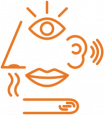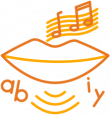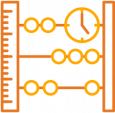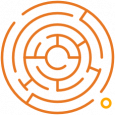
Practical Life
In this area, children are engaged in everyday activities that they would encounter in everyday life. The main goal of work is to develop focus, coordination, a sense of order and independence.
Children learn to take care of themselves. To get dressed, comb their hair, prepare their food, and dine, handle objects and various materials. Collaborate with other children and teachers. Be respectful and offer help to others. Look after their surroundings and take care of things around them. Decent behavior.
Through these activities, the child gets used to and learns to recognize the value of work. Positive feedback from the environment creates a feeling of self-confidence and motivation for further activity.

Sensory Area
Children learn about the world around them using all their senses. This is done with Montessori materials designed specifically for the development of visual, tactile, taste, auditory and smell sense, and the sense of temperature and weight. The main activities when working with the senses include sorting, dividing, assigning, and naming.

Language
Conversation, singing, motion games and object naming lead to general speech development. When children are able to speak well and correctly, they can start writing and reading.
Children learn to make decisions, judge, speak and listen, and understand the meaning of words and grammar. Gradually, they expand their vocabulary, understand the sequence of events, and understand coherent narration. Children of preschool age already start learning to write and read.

Mathematics
Love for mathematics is innate and it is very important to integrate activities related to counting, weighing and measuring time into the child's daily activities. Early experience with mathematics, such as sorting, assigning, and counting are the basis for further mathematical knowledge.

Cosmic Education
Children are naturally interested in animals, plants and the land. They want to know why things are happening and how they work. The teachers at Duhovka present all information to children in an interesting way and lead them to independence. The aim is to create a summary of knowledge and start with what children already know and to move on to information that is new to them - in an easy and natural way. It is important to connect smaller ideas with large units so that children can gain an overview of the world and understand the context.




